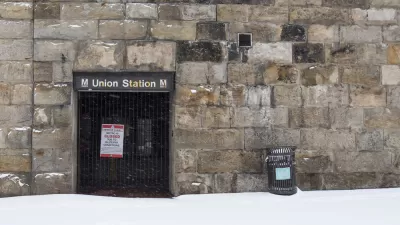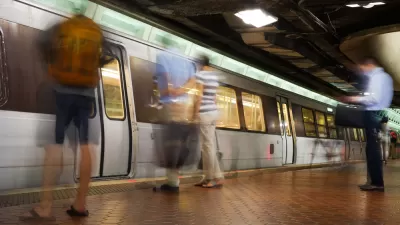A major financier of Washington D.C.'s Metro system has agreed to give the transit system an extra 10 days to collect more than $40 million from the troubled system, complying with a judge's ruling that forcing Metro to pay could cause great harm.
"Without the extra time, Metro could have found itself in default by today, allowing KBC Group of Belgium to immediately collect $17 million from the agency Monday, according to an attorney for KBC in court yesterday."
"U.S. District Judge Rosemary M. Collyer said she agreed with Metro's contention that if KBC prevailed, other banks might be prompted to demand millions in payments in similarly troubled financing deals at Metro and other transit agencies across the country, posing 'very real' harm to riders. Although there is public interest in enforcing contracts, Collyer said, there is also public interest 'in not putting at terrible risk the transit system.'"
"KBC's demand was triggered by the collapse of American International Group, the insurance giant that U.S. taxpayers recently rescued from bankruptcy. AIG had guaranteed Metro's financial deals with the bank, but AIG's financial problems, specifically the downgrading of its credit rating, invalidated the company's guarantees, putting the deals in technical default and allowing the bank to ask for all its money at once."
"Metro has 14 other financing deals with banks that could go into default. Officials said it would cost $50 million to $100 million to purchase the additional insurance to replace AIG as guarantor."
FULL STORY: Bank Shelves Demand That Metro Pay Up

Maui's Vacation Rental Debate Turns Ugly
Verbal attacks, misinformation campaigns and fistfights plague a high-stakes debate to convert thousands of vacation rentals into long-term housing.

Planetizen Federal Action Tracker
A weekly monitor of how Trump’s orders and actions are impacting planners and planning in America.

San Francisco Suspends Traffic Calming Amidst Record Deaths
Citing “a challenging fiscal landscape,” the city will cease the program on the heels of 42 traffic deaths, including 24 pedestrians.

Defunct Pittsburgh Power Plant to Become Residential Tower
A decommissioned steam heat plant will be redeveloped into almost 100 affordable housing units.

Trump Prompts Restructuring of Transportation Research Board in “Unprecedented Overreach”
The TRB has eliminated more than half of its committees including those focused on climate, equity, and cities.

Amtrak Rolls Out New Orleans to Alabama “Mardi Gras” Train
The new service will operate morning and evening departures between Mobile and New Orleans.
Urban Design for Planners 1: Software Tools
This six-course series explores essential urban design concepts using open source software and equips planners with the tools they need to participate fully in the urban design process.
Planning for Universal Design
Learn the tools for implementing Universal Design in planning regulations.
Heyer Gruel & Associates PA
JM Goldson LLC
Custer County Colorado
City of Camden Redevelopment Agency
City of Astoria
Transportation Research & Education Center (TREC) at Portland State University
Jefferson Parish Government
Camden Redevelopment Agency
City of Claremont





























